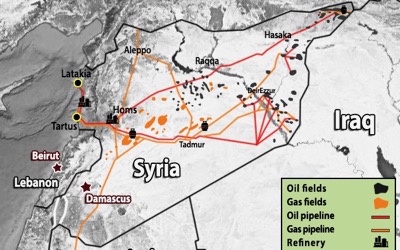
On 23 October 2019, President Putin’s Special Envoy in the Middle East, Mikhail Bogdanov, asserted that all Syrian oil and gas sites must return under the control of the Syrian Arab Republic.
President Bashar al-Assad had already granted concessions to Russian companies, which have so far not been able to exploit them.
During the negotiations preceding the Turkish "Operation Peace Spring," the United States had insisted that the Rojava oil fields be operated by US or Israeli companies.
The war against Syria was planned by the United States as early as 2003 (Syrian Acountability Act), that is, at a time when its underground riches were still unknown and the competing Qatar and Iran pipelines were not yet on the map. It is therefore a mistake to assume that this war, like many others, was driven by oil interests.
Nevertheless, at the beginning of the war, the "Friends of Syria" learned about the three-dimensional explorations secretly conducted by the Norwegian company Sagex (since then bought by the multinationl Schlumberger). Germany and the United Arab Emirates, as co-chairs, were then charged with handing out contracts to those states that joined in the war against Syria.
It remains to be seen whether the reported outcome of the explorations is accurate. If confirmed, Syria is sitting on gas reserves comparable to those of Qatar, which is likely to cause a problem with her two allies and major gas producers: Russia and Iran.

















Stay In Touch
Follow us on social networks
Subscribe to weekly newsletter